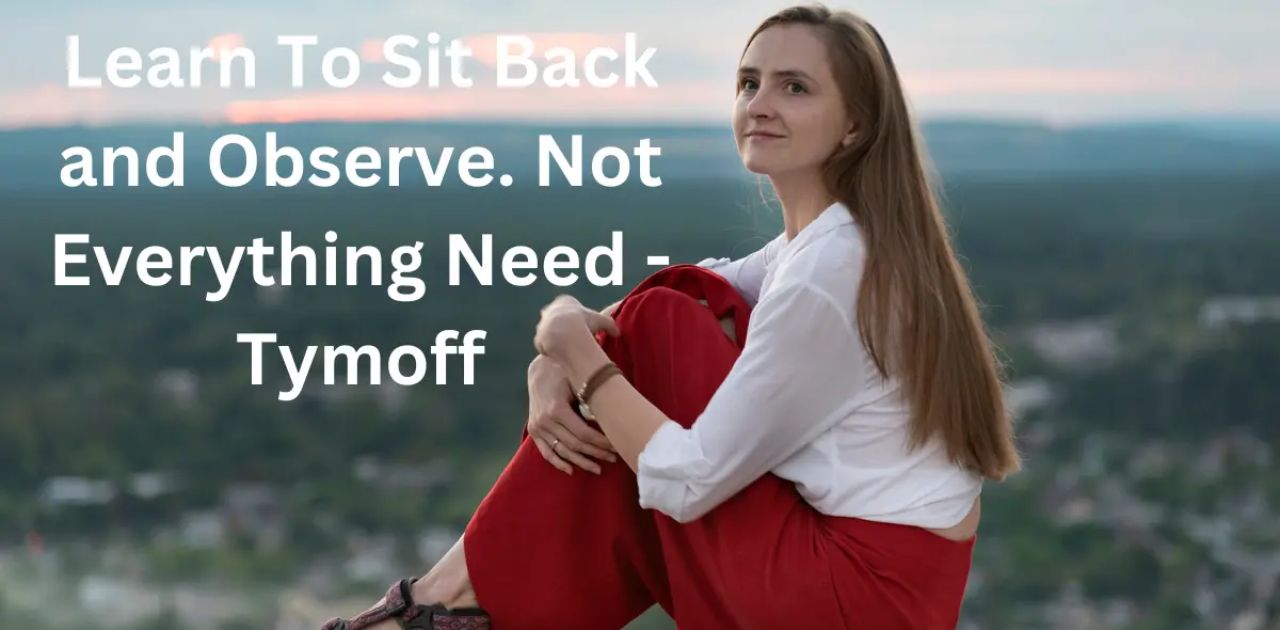The Importance of Observation in Daily Life
In today’s fast-paced world, the tendency to rush into learn to sit back and observe. not everything need – tymoff action at the first sign of an issue is widespread. However, the ability to learn to sit back and observe is an invaluable skill that can significantly enhance both personal and professional experiences. This approach promotes a greater understanding of situations, leading to improved decision-making and emotional intelligence.
Observation serves as a foundational principle for gathering information and assessing circumstances without bias. By taking a moment to step back, individuals can cultivate awareness, leading to a clearer interpretation of events and dynamics. For instance, in a workplace scenario, a manager faced with employee conflict may feel the urgency to intervene immediately. However, if the manager opts to observe the interactions over time, they might identify underlying issues that necessitate a more thoughtful approach, such as mediation strategies or individual feedback sessions, rather than a hasty resolution that may exacerbate tensions.
Moreover, in daily life, learning to sit back and observe can foster healthier relationships. Friends and family members often navigate complex emotional landscapes. learn to sit back and observe. not everything need – tymoff An observer can recognize nonverbal cues, underlying feelings, or patterns of behavior that might otherwise be overlooked in a reactive state. This enhanced insight can lead to more empathetic and effective communication, allowing for a supportive environment where individuals feel valued and understood.
Real-life examples abound; a teacher who senses a student struggling might fare better by observing rather than intervening immediately. Their careful observation could unveil deeper learning challenges, enabling them to tailor support and strategies that align with the student’s needs. Ultimately, the practice of observation encourages us to reflect, analyze, and respond thoughtfully, enhancing our ability to navigate complex situations with clarity and confidence.
Mindfulness and Its Role in Observational Learning
Mindfulness can be described as the practice of being fully present and engaged in the moment, without judgment or distraction. It encourages individuals to observe their thoughts, emotions, and physical sensations with a sense of acceptance and curiosity. This heightened state of awareness is essential for effective observational learning, allowing one to discern patterns, behaviors, and insights that might otherwise go unnoticed.
Incorporating mindfulness into daily routines starts with simple practices such as meditation, deep breathing exercises, or mindful walking. These techniques help cultivate a focus on the present, making it easier to learn to sit back and observe. For instance, during a mindful meditation session, one might focus on their breath and gently redirect their mind if it wanders. This practice not only improves concentration but also encourages an attitude of patience and tolerance toward fleeting thoughts and feelings.
The effects of mindfulness extend beyond personal learn to sit back and observe. not everything need – tymoff introspection. By developing observational skills through mindfulness, individuals are better equipped to understand the environment and interactions with others. Observers can identify subtle cues and changes in behavior, which may lead to deeper comprehension of social dynamics or individual motivations. As the saying goes, ‘not everything requires action’; sometimes, just taking a moment to witness what unfolds can provide invaluable lessons.
Moreover, regular practice of mindfulness can significantly reduce stress and anxiety. When one learns to sit back and observe rather than react impulsively, it allows for a more balanced emotional response to challenging situations. Over time, this fosters resilience, encouraging individuals to approach difficulties with a calm and composed mindset. Ultimately, embracing learn to sit back and observe. not everything need – tymoff mindfulness in everyday life empowers individuals to enhance their observational prowess while promoting overall well-being.
Case Studies: Successful Leaders Who Practice Observational Skills

In the landscape of effective leadership, many renowned figures have demonstrated the significant benefits of cultivating observational skills. These leaders often exemplify the principle of learning to sit back and observe, understanding that not everything necessitates immediate action. By focusing on observation, they uncover insights that drive innovative solutions and creative breakthroughs. One notable figure in this domain is Microsoft co-founder Bill Gates. Gates has often emphasized the importance of observing market trends and technological advancements before making decisions. His ability to take a step back allowed him to foresee the potential of the internet, which eventually led Microsoft to dominate the software industry. By not rushing in, he was able to formulate strategies that were ahead of their time.
Similarly, the late Steve Jobs of Apple Inc. showed remarkable observational capabilities throughout his career. Jobs was known for his attention to detail and user experience. By observing consumer behavior and technological trends, he was able to introduce products that resonated deeply with users, such as the iPod and iPhone. His knack for understanding what consumers truly wanted, often before they themselves were aware, showcases the power of sitting back and observing rather than hastily reacting to competition.
Another notable case is that of Indra Nooyi, former CEO learn to sit back and observe. not everything need – tymoff of PepsiCo, who became famous for her thoughtful approach to leadership. By prioritizing listening and observation, Nooyi was able to identify changes in consumer preferences that led to innovative product developments within the company. Her emphasis on observational skills enabled her to steer the company toward healthier product lines, effectively responding to a burgeoning market demand. These examples illustrate the profound impact that sitting back and observing can have on decision-making and problem-solving, highlighting a pivotal lesson for aspiring leaders: not everything needs immediate action. Implementing this principle can lead to more thoughtful decisions and ultimately, greater success.
Practical Tips for Cultivating the Habit of Observation
To effectively cultivate the habit of observation, individuals can implement a variety of practical strategies that integrate seamlessly into their daily routines. One noteworthy approach is to set aside dedicated time for reflection. Allocating a few moments each day to pause and consider the events around you can significantly enhance your capacity to observe rather than react. This ritual allows you to process your thoughts and feelings, fostering an environment where you can learn to sit back and observe the subtleties of life.
Another valuable method is journaling your observations. Keeping a diary or a digital journal can serve as a powerful tool to capture moments that catch your attention. By documenting your surroundings, interactions, and personal reflections, you can develop a deeper learn to sit back and observe. not everything need – tymoff understanding of the world and your place in it. This practice not only sharpens your observational skills but also helps you recognize that not everything needs immediate action—sometimes, contemplation is all that is required.
Engaging in nature walks is a further effective technique. Taking time to stroll through parks or nature reserves allows you to immerse yourself in the environment and observe the intricate details that may typically go unnoticed. The sights and sounds of nature offer a perfect backdrop for practicing observation without the pressures of decision-making or action.
Lastly, participating in group settings where listening is prioritized can enhance your observational capabilities. When interacting with others, focus on actively learn to sit back and observe. not everything need – tymoff listening rather than formulating responses. This shift in focus encourages a shared environment where everyone can learn to sit back and observe their surroundings, fostering a collective appreciation for thoughtful engagement over hasty reactions. By adopting these strategies, individuals can slowly but surely embed the art of observation into their daily lives, acknowledging that not every situation demands their immediate response.

